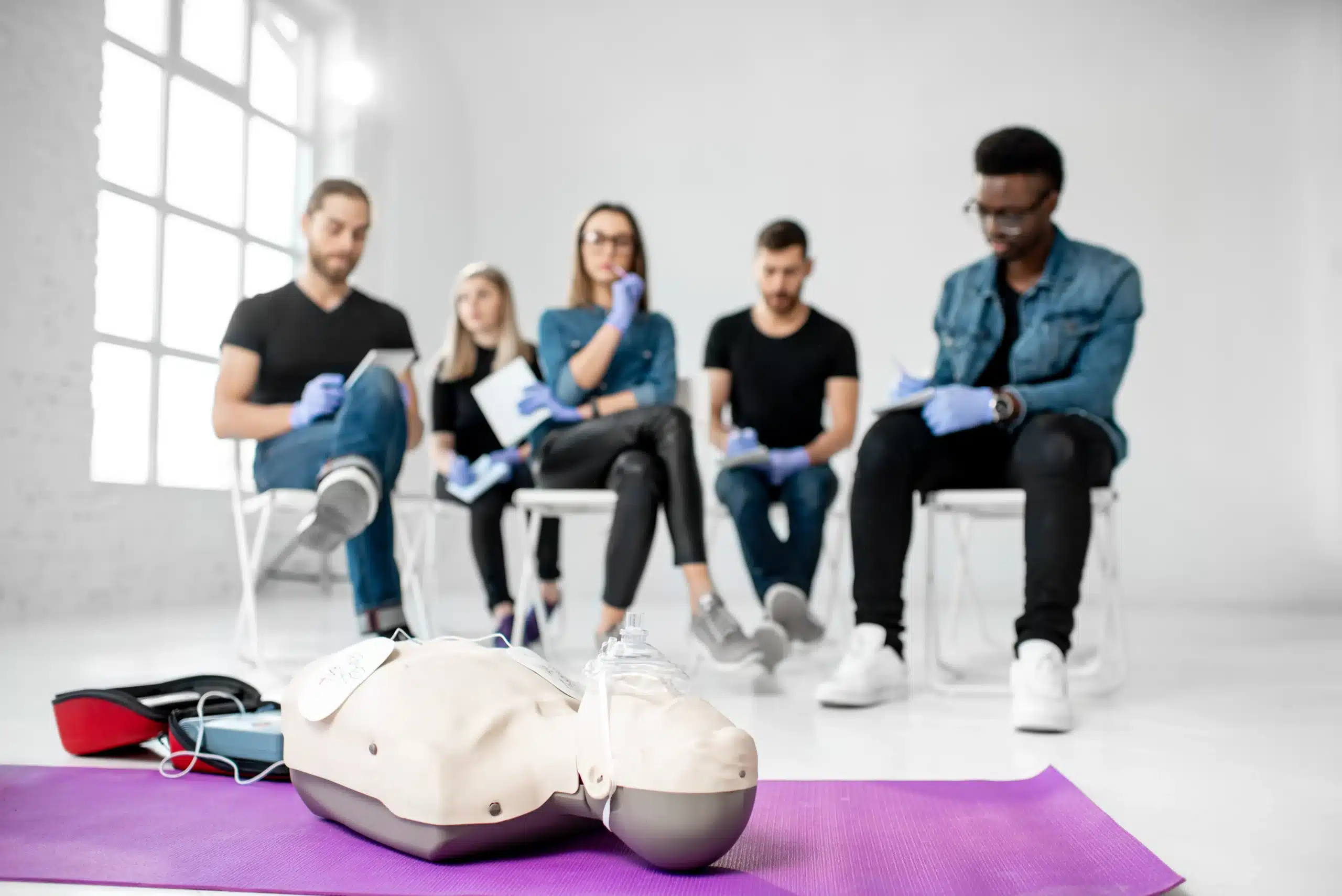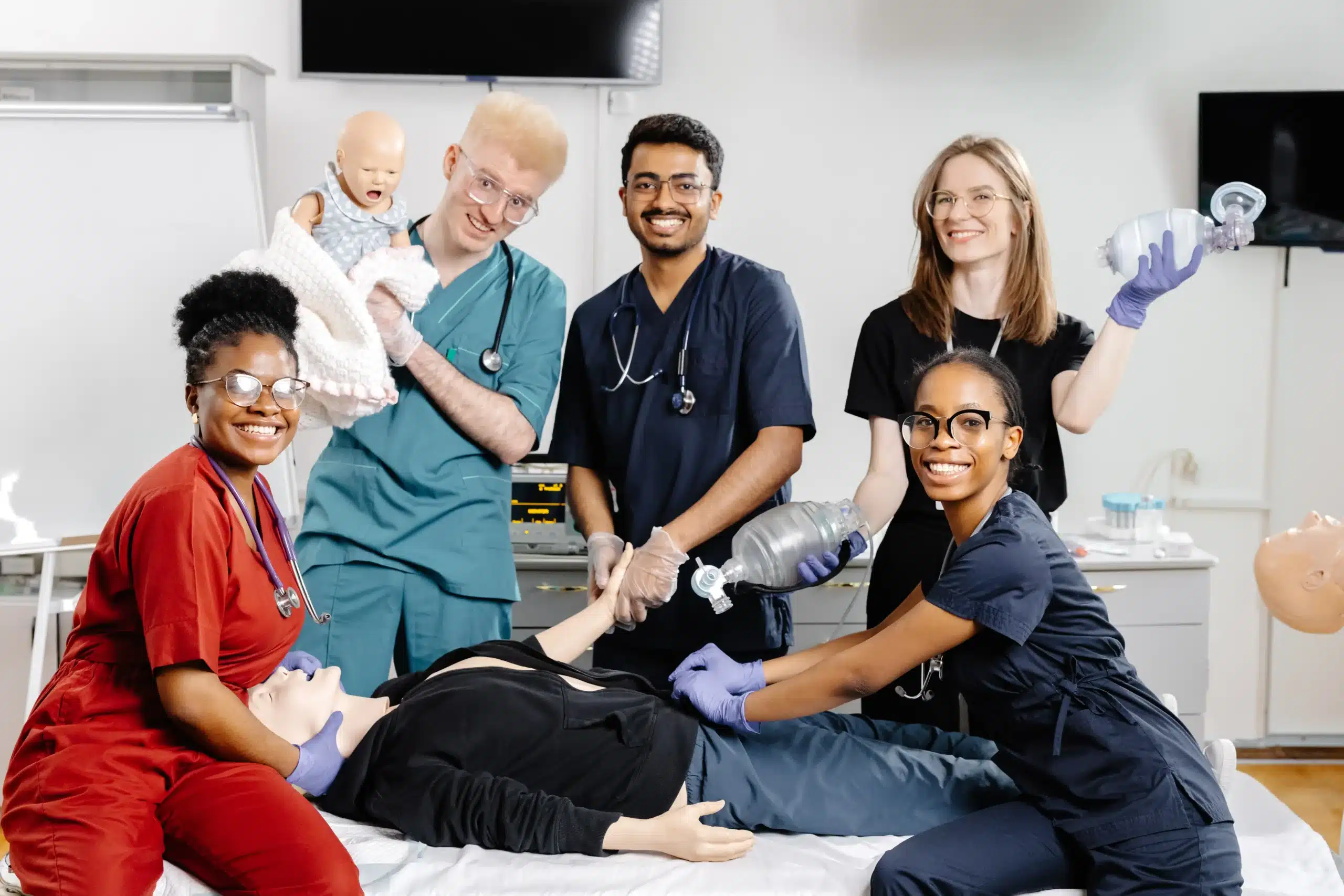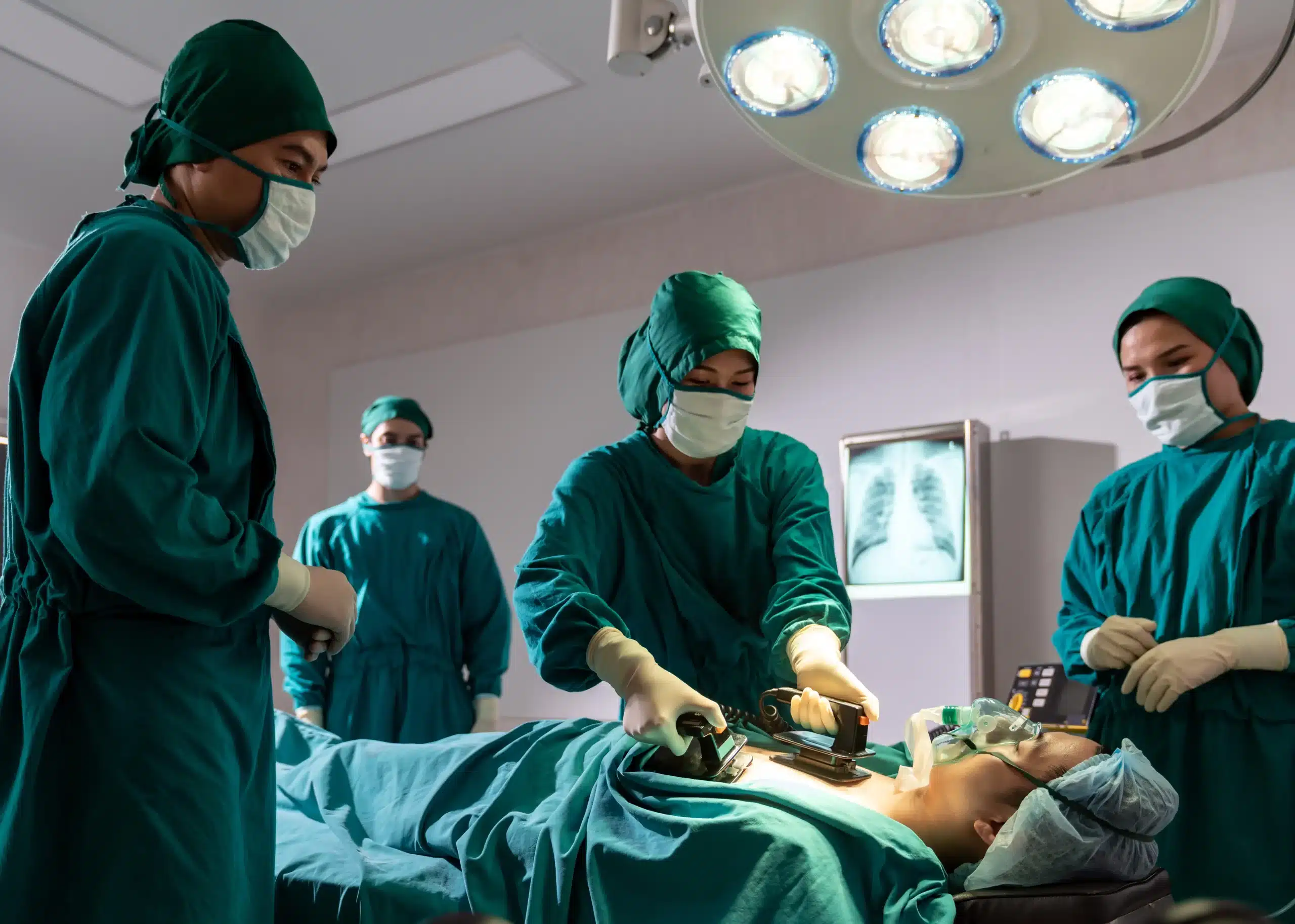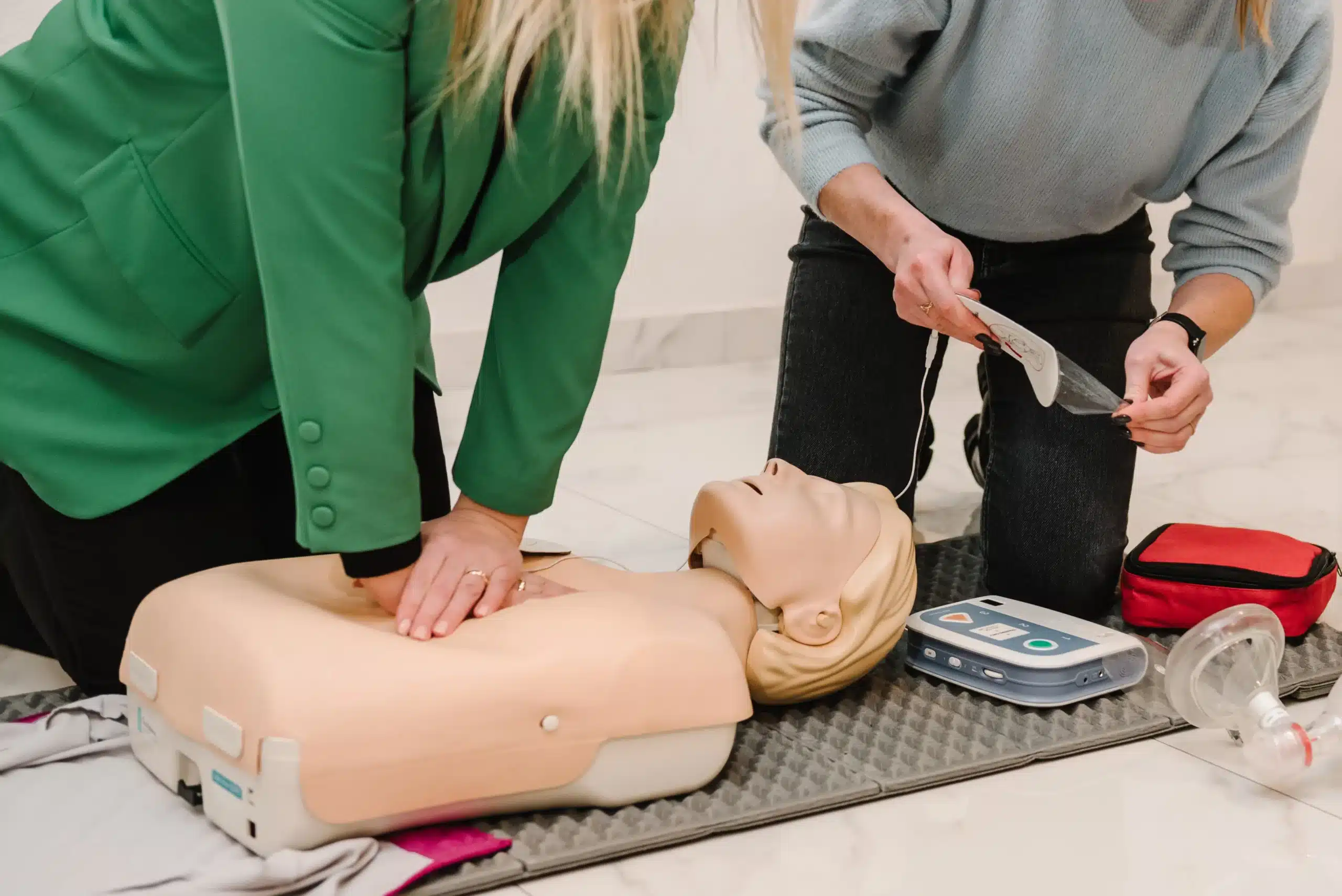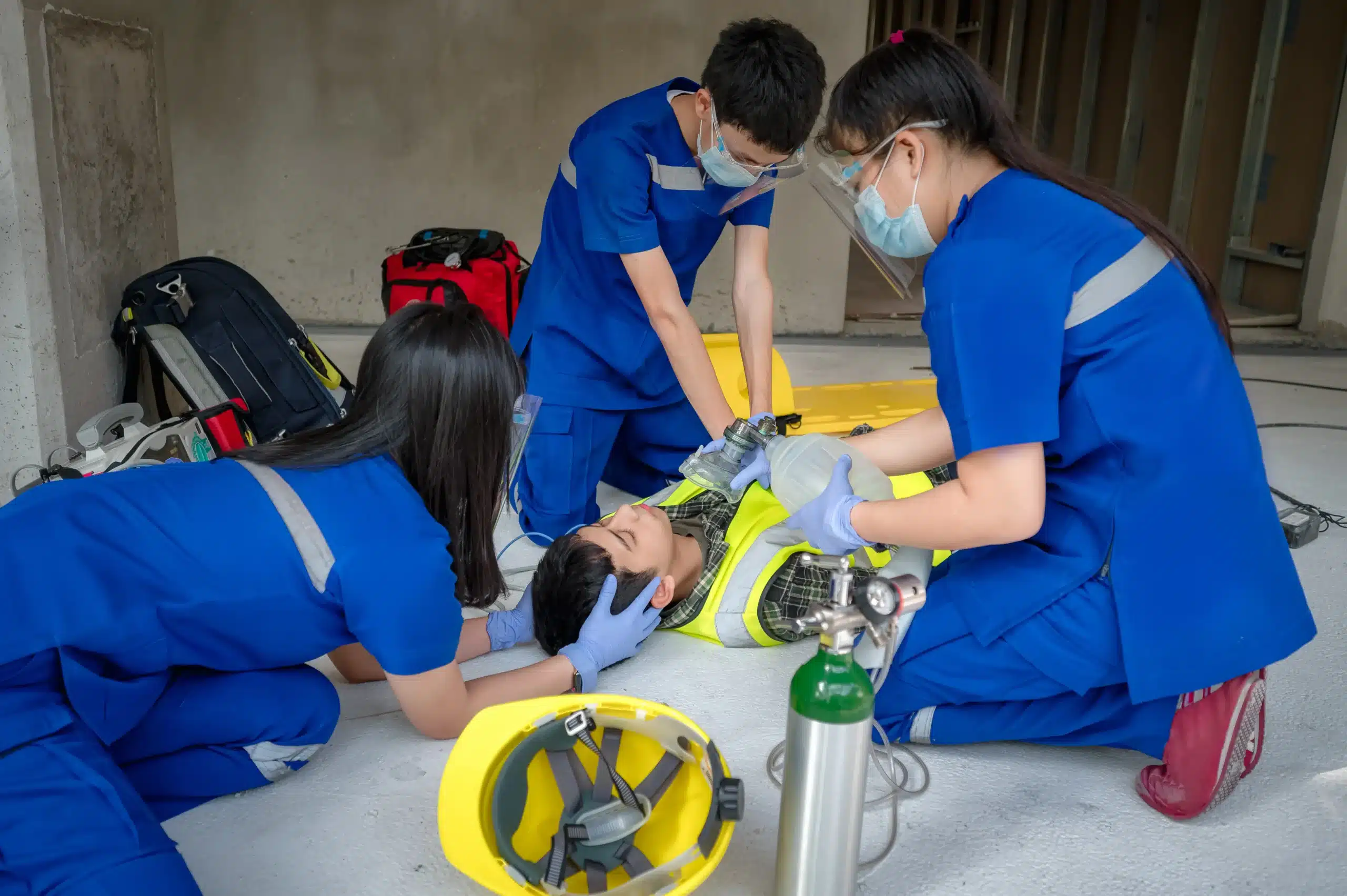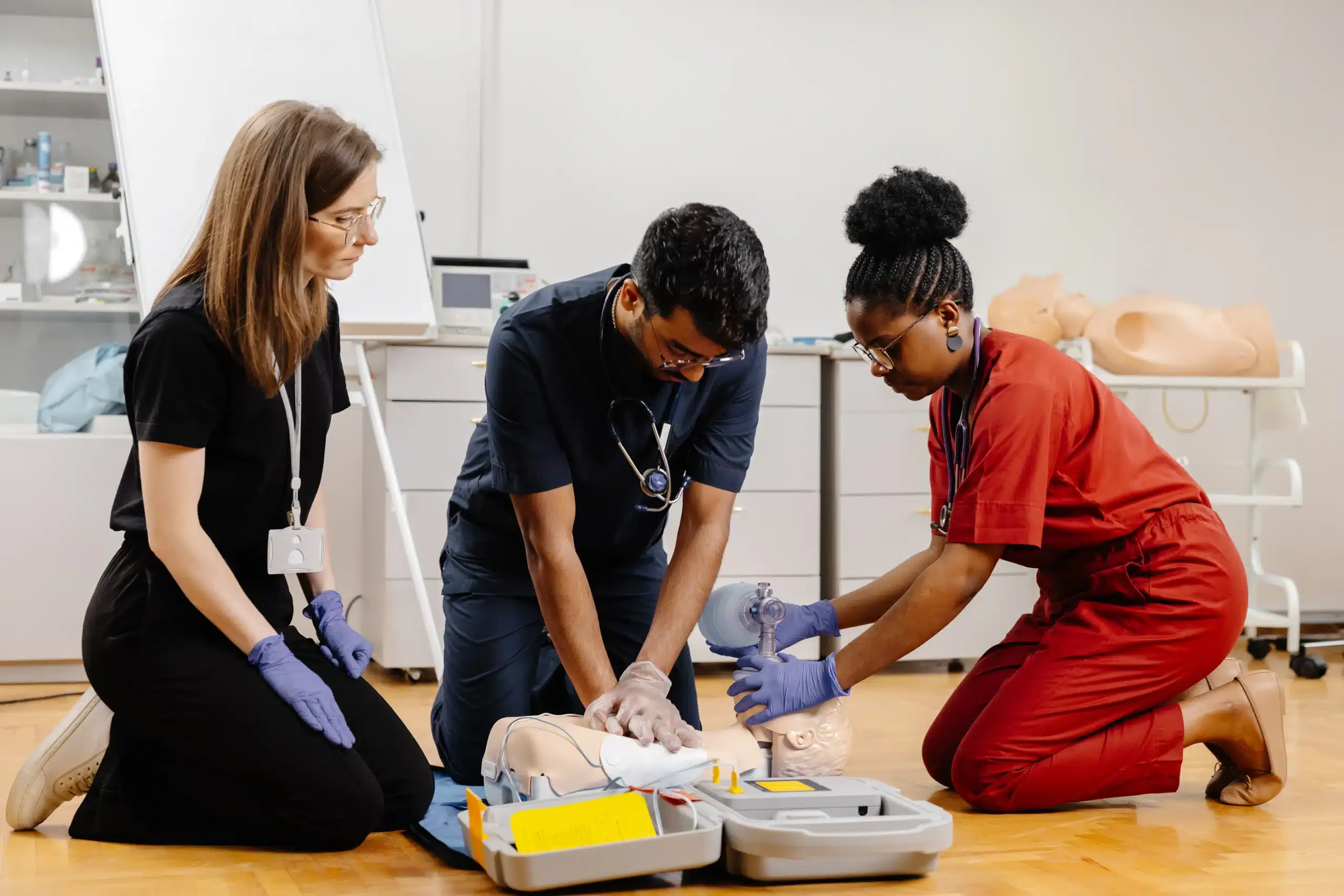Emergencies can happen anytime, anywhere. Are you prepared to respond? CPR classes in Concord provide the skills and knowledge to act quickly and confidently in a crisis. This guide explores the various CPR certification options available in Concord, including BLS, ACLS, and PALS, and helps you choose the right course for your needs. We’ll also cover the importance of CPR training, the costs involved, and what to expect during your class. Whether you’re a healthcare professional, a childcare provider, or simply someone who wants to be prepared, this article has you covered.
Key Takeaways
- CPR skills are essential for everyone in Concord: Whether you’re a healthcare provider, work with children, or simply want to be prepared, CPR training empowers you to make a difference in emergencies.
- Find the right CPR class in Concord for your needs: Explore various providers, course formats, and certifications (BLS, ACLS, PALS, First Aid) to find the perfect fit. Consider factors like cost, schedule, and your learning style.
- Hands-on practice and current techniques are key: Choose a CPR course that prioritizes practical application with modern equipment and is taught by experienced instructors following the latest guidelines.
What is CPR and Why is it Important in Concord?
Cardiopulmonary resuscitation (CPR) is a life-saving technique used when someone’s heartbeat or breathing has stopped. It combines chest compressions and rescue breaths to keep blood and oxygen flowing to vital organs until professional medical help arrives. Learning CPR can dramatically increase the chances of survival for someone experiencing a cardiac emergency.
CPR is essential for everyone, not just medical professionals. Emergencies can happen anywhere, anytime. Having trained individuals in our community—like here in Concord—means there’s a better chance someone nearby will know how to respond effectively in a crisis. Effective CPR training empowers people to act quickly and confidently, which can make all the difference. Whether you’re a healthcare provider, a teacher, a parent, or just someone who wants to be prepared, knowing CPR can truly save lives. If you’re looking for CPR training in Concord, you can find a variety of options, from basic CPR and first aid to more advanced certifications like ACLS, at local training centers.
CPR Classes in Concord: What Are Your Options?
Finding the right CPR class can feel overwhelming, but it doesn’t have to be. Concord offers a variety of courses designed to meet different needs and experience levels. Whether you’re a healthcare professional, a concerned parent, or simply want to be prepared for emergencies, there’s a class for you. Let’s explore some of the most common options.
Basic Life Support (BLS)
BLS certification focuses on single-rescuer CPR and is ideal for healthcare providers and anyone else who might need to respond to a cardiac arrest. These BLS courses cover essential techniques like chest compressions, rescue breaths, and how to use an automated external defibrillator (AED). You’ll learn how to recognize the signs of a cardiac arrest and provide immediate care until professional help arrives. Many Concord training centers offer BLS certification, often combining it with other life-saving skills like First Aid. For those looking for group discounts, check out group class options.
Advanced Cardiovascular Life Support (ACLS)
For healthcare professionals who regularly manage cardiovascular emergencies, ACLS certification is essential. This advanced training builds upon the foundation of BLS, delving into more complex algorithms and team dynamics during resuscitation. ACLS courses cover topics like airway management, intravenous access, and pharmacological interventions. Concord’s training centers offer ACLS courses that meet the rigorous standards of organizations like the American Heart Association. You can find more information on various CPR and First Aid courses in our Northern California CPR directory.
Pediatric Advanced Life Support (PALS)
PALS certification equips healthcare providers with the specialized knowledge and skills to respond to emergencies involving infants and children. These courses cover pediatric-specific resuscitation techniques, including airway management and medication dosages. If you work in pediatrics, emergency medicine, or a similar field, PALS certification is often a requirement. Check with local Concord training centers for upcoming PALS courses and schedules. Safety Training Seminars also offers a course on the American Academy of Pediatrics NRP, which may be relevant to your professional needs.
First Aid and CPR Combo Courses
Many Concord training centers offer combined First Aid and CPR courses, providing a comprehensive approach to emergency preparedness. These courses teach you how to respond to a wide range of situations, from treating minor injuries like cuts and burns to managing life-threatening conditions like choking and cardiac arrest. Learning both CPR and First Aid together can save you time and ensure you’re well-equipped to handle any emergency. For childcare providers, the EMSA Child Care Health & Safety course may also be beneficial.
CPR Class Costs in Concord
Knowing the price range for CPR classes helps you budget and find the best value. CPR class costs in Concord vary depending on the type of certification, the course format (in-person or blended learning), and the training center.
Typical Prices
You’ll find a range of CPR courses in Concord, from basic CPR and first aid to advanced certifications like ACLS and PALS. Basic CPR classes typically start around $75, while more specialized courses like PALS or ACLS can range from $150 to $250. It’s always a good idea to check with specific training providers like Safety Training Seminars for their most up-to-date pricing. They offer a low price guarantee and courses in nearby Brentwood and often have options for those looking for training in Concord.
Discounts and Deals
Many training centers offer discounts for group registrations, students, or returning customers. Look for deals like early bird registration or package discounts that combine CPR with first aid or other certifications. Group discounts can significantly lower the cost per person, making it a great option for workplaces or community groups.
Price Guarantees
Some providers, including Safety Training Seminars, offer a low-price guarantee, ensuring you get the best possible value for your training. Don’t hesitate to compare prices and ask about any guarantees before committing to a class. This can save you money and ensure you’re getting a quality course at a fair price.
Find Your Perfect CPR Class in Concord
Finding the right CPR class can feel overwhelming, but Concord offers a variety of options to suit different needs and schedules. Let’s explore some local training centers and discuss the pros and cons of online versus in-person learning.
Local Training Centers
Safety Training Seminars
Safety Training Seminars offers a comprehensive range of American Heart Association (AHA) certified courses, including BLS, ACLS, PALS, CPR, and First Aid. They also offer specialized courses like the EMSA Child Care Health & Safety program, making them an excellent choice for childcare providers in California. For those looking for cost-effective options, they offer group discounts. Their focus on Antioch, Brentwood, and Concord ensures localized expertise. You can learn more about their PALS certification.
CPR Training Center
With nearly three decades of experience, CPR Training Center provides AHA-certified CPR, BLS, ACLS, and PALS courses. Serving the greater Bay Area, their Concord location offers convenient access to high-quality instruction from seasoned professionals.
CPR Education
CPR Education offers CPR classes and certification programs throughout Concord and the surrounding communities. Their classes, held regularly in downtown Concord, are accessible to residents across the Bay Area. This central location and flexible scheduling make it easier to fit CPR training into your busy life.
CPR for Life
CPR for Life provides CPR and First Aid training in Concord and the wider San Francisco Bay Area. As an AHA and EMS Safety Services training center, they offer a range of courses to meet diverse needs.
Online vs. In-Person
Many training centers in Concord offer flexible learning formats, including in-person, online, and blended learning. Consider your learning style and schedule when making your decision. In-person classes provide hands-on practice and direct interaction with instructors, while online courses offer greater flexibility and convenience. Blended learning combines the benefits of both, allowing you to learn at your own pace and then practice your skills in person. Choosing the right format can significantly impact your learning experience.
Class Schedules and Certification: What to Expect
Finding the right CPR class often comes down to logistics. Luckily, there’s plenty of flexibility when it comes to scheduling your training in Concord. Let’s break down what you can expect regarding class times and how certification works.
Weekday, Weekend, and Evening Classes
Juggling work, family, and other commitments can make it tough to fit in extra training. Concord offers a variety of CPR class schedules to accommodate busy lifestyles. You’ll find courses running on weekdays, weekends, and even evenings, making it easier to find a time that works for you. Many training centers offer various learning formats, including in-person, online, and blended learning, allowing you to find a CPR class that fits your schedule and learning style. Check with specific providers like Safety Training Seminars for their current schedule of CPR classes in Brentwood. They serve surrounding areas like Antioch and Concord, too.
Your CPR Class Experience
Your CPR class will be a mix of interactive learning and hands-on practice. Expect a combination of lectures, demonstrations, and simulations to help you grasp the techniques and build your confidence. Instructors create a supportive environment where you can ask questions and practice your skills. Learning CPR in Concord is vital, and providers like CPR Education work to ensure accessibility for the entire Bay Area community, including nearby areas like Martinez. For those looking for specialized training, consider exploring options like the PALS certification offered by Safety Training Seminars.
Certification: How Long it Lasts & Renewing
Upon successful completion of your CPR course, you’ll receive an official American Heart Association certification card. This card is typically valid for two years. Before your certification expires, you’ll need to take a renewal course to stay up-to-date with the latest guidelines and maintain your credentials. Keep track of your expiration date and plan ahead to ensure your certification remains current. For those working with infants, exploring the NRP certification could be a valuable addition to your skillset.
Who Needs CPR Certification?
Knowing CPR can make a real difference in critical situations. While valuable for everyone, certain professions benefit significantly from this life-saving skill. Let’s explore who should strongly consider CPR certification.
Healthcare Professionals
For healthcare providers, CPR certification is often a job requirement. Doctors, nurses, and other medical professionals regularly encounter situations where CPR is needed. From hospitals to private practices, these individuals are on the front lines of emergency response. ACLS courses provide advanced training in life support techniques specifically designed for healthcare professionals working in Concord and surrounding areas like Antioch and Brentwood.
Childcare Providers and Educators
Working with children carries a unique responsibility. Childcare providers and educators should be prepared to handle medical emergencies, including situations requiring CPR. Specialized CPR training focuses on the specific needs of infants and children, equipping caregivers with the skills to respond effectively. This training provides peace of mind for parents and ensures a safer environment for kids in Concord. For those working with newborns, the NRP certification provides comprehensive training in neonatal resuscitation. Additionally, the EMSA Child Care Health and Safety course offers a broader curriculum in health and safety practices for childcare providers.
Fitness Instructors and Coaches
Fitness professionals often guide clients through strenuous physical activities. In these settings, the risk of a medical emergency, while low, is always present. CPR-certified instructors and coaches can respond quickly and confidently if a client experiences a sudden cardiac event. Flexible learning options, including online and in-person classes, make it easier for busy fitness professionals to get certified.
General Public and Community Members
Even if it’s not a job requirement, knowing CPR is a powerful skill. Emergencies can happen anytime, anywhere. Bystanders trained in CPR can provide immediate assistance while waiting for professional help to arrive. This quick action can significantly improve the chances of survival. Consider getting CPR certified–it empowers you to make a difference in your community. Check out our Northern California CPR directory for more resources and training centers near you.
Get Ready for Your CPR Class
Knowing what to expect and how to prepare can make your CPR class experience smoother and more effective. Here’s a quick guide to get you ready:
What to Bring
Keep it simple. A notepad and pen are helpful for jotting down key points or questions during the class. Bring a water bottle to stay hydrated, especially during hands-on practice. Your CPR class at Safety Training Seminars provides all the necessary equipment, including training manikins, so you don’t need to bring your own.
Pre-Class Prep
While not required, reviewing basic CPR concepts beforehand can be beneficial. Brushing up on the steps of CPR, like chest compressions and rescue breaths, can boost your confidence going into the class. You can find helpful resources and refreshers on the American Heart Association website. This pre-class prep will allow you to focus on mastering the techniques during the training.
Dress Code and Physical Requirements
CPR classes involve hands-on practice, so wear comfortable clothes that allow you to move freely. Think athletic wear or comfortable layers. You’ll be kneeling and working with your arms, so restrictive clothing isn’t ideal. Comfortable shoes are also important. While CPR training does involve physical activity, it’s generally manageable for most fitness levels. If you have any concerns about the physical requirements, contact Safety Training Seminars; they are happy to answer any questions and ensure you feel comfortable participating.
Training Tools and Instructor Expertise
Choosing the right CPR class involves more than just finding a convenient location. You also want to ensure you’re learning with the best equipment and from highly qualified instructors. This section covers what to look for in a top-notch CPR training program.
Equipment You’ll Use
High-quality CPR training utilizes equipment that provides real-time feedback. Think of it like having a personal coach right there with you. Modern training mannequins offer detailed feedback on the depth and rate of your compressions, helping you refine your technique and build confidence. Studies show that students practicing with these advanced mannequins are more engaged and achieve better CPR quality. This immediate feedback is crucial for mastering the skills needed to perform effective CPR in a real emergency. Look for classes that use mannequins with these capabilities. It can make a real difference in your learning experience.
Instructor Qualifications
A skilled instructor is just as important as the equipment. Experienced instructors create a supportive learning environment where you can ask questions and receive personalized guidance. They should also be adept at providing constructive feedback, helping you identify areas for improvement and build on your strengths. A good instructor will also adapt their teaching based on student input, ensuring the curriculum remains relevant and effective. Research highlights the importance of instructor feedback in improving chest compression rates during training. So, when choosing a CPR class, inquire about the instructor’s experience and teaching style. A knowledgeable and supportive instructor can significantly impact your confidence and competence in performing CPR.
CPR Training Myths: Debunked
Let’s clear up some common misconceptions about CPR training. Knowing the facts helps you choose the right course and get the most from your training.
Online-Only Certification: The Truth
While online resources can be helpful learning tools, a completely online CPR certification often isn’t enough for healthcare jobs and other regulated professions. Many organizations, including hospitals and schools, require hands-on training and in-person assessment. Before signing up for an online-only course, check the specific requirements for your profession. You might end up wasting time and money on a certification that doesn’t meet your needs. Safety Training Seminars offers AHA courses that fulfill these requirements.
Up-to-Date CPR Techniques
CPR guidelines and best practices change as medical knowledge advances. Choosing a training program that uses current techniques is essential. Effective CPR training involves staying current with the latest guidelines and providing hands-on practice. At Safety Training Seminars, our instructors stay informed on the latest recommendations from the American Heart Association, so you learn the most effective techniques.
Hands-on Practice: Why It Matters
Reading about CPR and actually performing it are two different things. Hands-on training is the best way to learn CPR. It builds your confidence and lets you practice essential techniques on manikins. This practice helps you develop muscle memory and react effectively in a real emergency. Our classes at Safety Training Seminars prioritize hands-on practice to prepare you for real-world situations.
CPR Training: Making Concord Safer
CPR training equips individuals with the skills and confidence to respond effectively during cardiac arrest emergencies. It empowers them to take immediate action, potentially saving lives and minimizing the impact of these critical events. This preparedness translates to a safer community for everyone in Concord.
Be Prepared, Be Confident
Effective CPR training goes beyond simply learning the mechanics. It’s about developing the confidence to apply those skills under pressure. High-quality CPR training, like that offered at Safety Training Seminars, emphasizes hands-on practice and provides opportunities to build muscle memory. This approach ensures that when faced with a real-life emergency, individuals can react swiftly and confidently. Staying current with the latest American Heart Association guidelines is also crucial, as techniques and best practices evolve. Safety Training Seminars’ courses cover these updated guidelines, ensuring participants receive the most relevant and effective training.
A Safer Community for Everyone
When more individuals in Concord are trained in CPR, the entire community benefits. This creates a network of potential lifesavers who can step in during emergencies before professional medical help arrives. Immediate CPR can significantly improve survival rates in cases of cardiac arrest. By investing in CPR training, Concord residents contribute to a safer environment for themselves, their families, and their neighbors. Safety Training Seminars offers group discounts, making it more accessible for community groups and organizations to train together and strengthen this network of first responders.
Related Articles
- Why CPR is Crucial in Healthcare
- HeartCode BLS in Concord: Your Complete Guide – Brentwood CPR Classes
- BLS ACLS PALS Training: Your Ultimate Guide – Brentwood CPR Classes
- PALS HeartCode Brentwood: Your Certification Guide – Brentwood CPR Classes
- CPR Classes in Brentwood: Find Training Near You – Brentwood CPR Classes
Frequently Asked Questions
What’s the difference between BLS and ACLS?
BLS (Basic Life Support) teaches the essentials of CPR and is suitable for anyone, including healthcare providers and the general public. ACLS (Advanced Cardiovascular Life Support) is more advanced, covering team dynamics, pharmacology, and more complex scenarios. It’s designed for healthcare professionals who manage cardiovascular emergencies.
How much do CPR classes cost in Concord?
Prices vary depending on the type of certification and the training center. Basic CPR classes usually start around $75, while advanced certifications like ACLS or PALS can range from $150 to $250. Look for providers like Safety Training Seminars who offer a low-price guarantee and sometimes group discounts.
What should I expect during a CPR class?
Expect a blend of instruction and hands-on practice. You’ll learn the steps of CPR, including chest compressions and rescue breaths, and practice on mannequins. Instructors create a supportive environment where you can ask questions and get personalized feedback.
How long is CPR certification valid, and how do I renew it?
CPR certification is typically valid for two years. To renew, you’ll need to take a recertification course before your current certification expires. This ensures you stay up-to-date with the latest guidelines.
Where can I find CPR classes in Concord?
Several training centers in Concord offer CPR classes. Safety Training Seminars, CPR Training Center, CPR Education, and CPR for Life are a few options. Check their websites or give them a call to find a class that fits your schedule and needs. Many offer various formats, including in-person, online, and blended learning.


